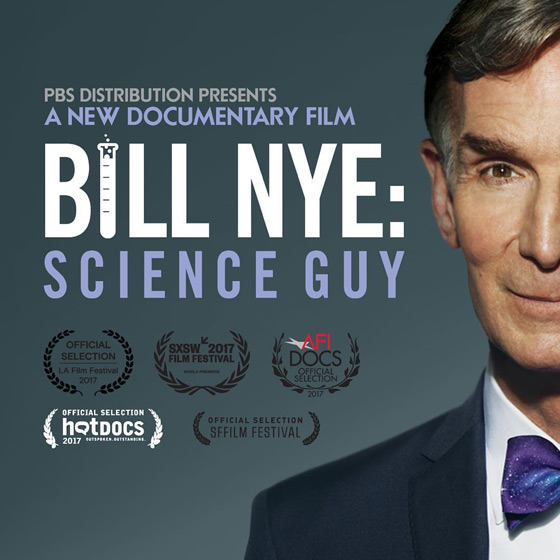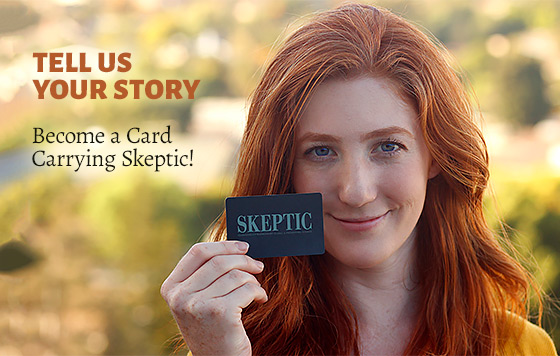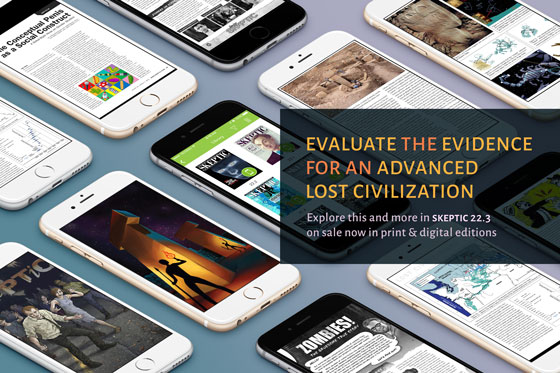In this week’s eSkeptic:
SKEPTIC EXCLUSIVE FILM CLIP
Bill Nye: Science Guy (a new documentary)
Bill Nye is a man on a mission: to stop the spread of anti-scientific thinking across the world. The former star of the popular kids show Bill Nye The Science Guy is now the CEO of The Planetary Society, an organization founded by Bill’s mentor Carl Sagan, where he’s launching a solar propelled spacecraft into the cosmos and advocating for the importance of science, research, and discovery in public life. With intimate and exclusive access — as well as plenty of wonder and whimsy — this behind-the-scenes portrait of Nye follows him as he takes off his Science Guy lab coat and takes on those who deny climate change, evolution, and a science-based world view. The film features Bill Nye, Neil deGrasse Tyson, Ann Druyan, and many others.
Below, you can watch an Exclusive Clip from the film in which Bill Nye has a few words with Ken Ham — founder of the Creation Museum in Petersburg, Kentucky, which promotes a pseudoscientific, young Earth creationist explanation of the origin of the Universe based on a literal interpretation of the Genesis creation narrative in the Bible.
A NEW STORY!
How Phil Zuckerman Became a Card-Carrying Skeptic
As we announced a few weeks ago in eSkeptic, we asked several friends to tell us about those “aha!” moments that led to their becoming skeptical thinkers. As promised, here is another one of their incredible stories on YouTube. Enjoy!
Phil Zuckerman is a professor of sociology and secular studies at Pitzer College in Claremont, California, and he is a card-carrying (and corn cob pipe gnawing) skeptic. He is the author of several books, including: Living the Secular Life (2015), and Society Without God (2008).
TELL US YOUR STORY!
Tell us your story and become a card-carrying skeptic! Thank you for being a part of our first 25 years. We look forward to seeing you over the next 25. —SKEPTIC

It’s possible that artificially intelligent systems might end up far more intelligent than any human. In this week’s eSkeptic, Matthew Graves warns that the same general problem-solving ability that makes artificial superintelligence a uniquely valuable ally may make it a uniquely risky adversary. This article appeared in Skeptic magazine 22.2 (2017).
Why We Should Be Concerned About Artificial Superintelligence
by Matthew Graves
The human brain isn’t magic; nor are the problem-solving abilities our brains possess. They are, however, still poorly understood. If there’s nothing magical about our brains or essential about the carbon atoms that make them up, then we can imagine eventually building machines that possess all the same cognitive abilities we do. Despite the recent advances in the field of artificial intelligence, it is still unclear how we might achieve this feat, how many pieces of the puzzle are still missing, and what the consequences might be when we do. There are, I will argue, good reasons to be concerned about AI.
The Capabilities Challenge
While we lack a robust and general theory of intelligence of the kind that would tell us how to build intelligence from scratch, we aren’t completely in the dark. We can still make some predictions, especially if we focus on the consequences of capabilities instead of their construction. If we define intelligence as the general ability to figure out solutions to a variety of problems or identify good policies for achieving a variety of goals, then we can reason about the impacts that more intelligent systems could have, without relying too much on the implementation details of those systems.

Our intelligence is ultimately a mechanistic process that happens in the brain, but there is no reason to assume that human intelligence is the only possible form of intelligence. And while the brain is complex, this is partly an artifact of the blind, incremental progress that shaped it—natural selection. This suggests that developing machine intelligence may turn out to be a simpler task than reverse- engineering the entire brain. The brain sets an upper bound on the difficulty of building machine intelligence; work to date in the field of artificial intelligence sets a lower bound; and within that range, it’s highly uncertain exactly how difficult the problem is. We could be 15 years away from the conceptual breakthroughs required, or 50 years away, or more.
The fact that artificial intelligence may be very different from human intelligence also suggests that we should be very careful about anthropomorphizing AI. Depending on the design choices AI scientists make, future AI systems may not share our goals or motivations; they may have very different concepts and intuitions; or terms like “goal” and “intuition” may not even be particularly applicable to the way AI systems think and act. AI systems may also have blind spots regarding questions that strike us as obvious. AI systems might also end up far more intelligent than any human.
The last possibility deserves special attention, since superintelligent AI has far more practical significance than other kinds of AI. […]
2018 | IRELAND | JULY 15–AUGUST 2
One of the best geology tours we’ve ever offered: an epic 19-day tour of the Emerald Isle!
Ireland’s famed scenic landscape owes its breathtaking terrain to a dramatic 1.75 billion year history of continental collisions, volcanoes, and glacial assault. Join the Skeptics Society for a 19-day immersive tour of the deep history of the Emerald Isle, while experiencing the music, hospitality, and verdant beauty that make Ireland one of the world’s top travel destinations.
For complete details about accommodation, airfare, and tour pricing, please download the detailed information and registration form or click the green button below to read the itinerary, and see photos of some of the amazing sites we will see.















